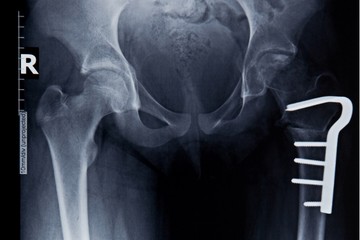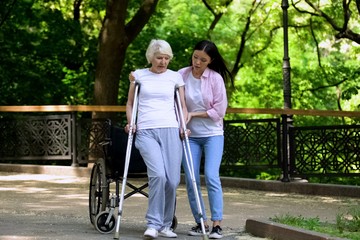Hip fracture surgery
Hip fracture surgery; broken hip; broken bone; broken femur; broken leg; Inter-trochanteric fracture repair; Subtrochanteric fracture repair; Femoral neck fracture repair; Trochanteric fracture repair; Hip pinning surgery; Osteoarthritis – hip
Hip fracture surgery is done to repair a break in the upper part of the thigh bone. The thigh bone is called the femur. It is part of the hip joint.
The type of surgery you have depends on the kind of fracture you have.
If your fracture is in the neck of the femur (the part just below the top of the bone) you may have a hip pinning procedure. During this surgery:
- You lie on a special table. This allows your surgeon to use an x-ray machine to see how well the parts of your hip bone line up.
- The surgeon makes a small incision (cut) on the side of your thigh.
- Special screws or nails are placed to hold the bones in their correct position.
- This surgery takes 2 to 4 hours.
A broken hip is a serious injury. People with broken hips may be at risk for other problems, such as pneumonia, blood clots, and muscle weakness. Some problems can be life-threatening.
Please call (620) 340-6181 for an appointment or consultation concerning hip issues.
If you have an intertrochanteric fracture (the area below the femur neck), your surgeon will use a special metal plate and special compression screws to repair it. Often, more than one piece of bone is broken in this type of fracture.
During this surgery:
- You lie on a special table. This allows your surgeon to use an x-ray machine to see how well the parts of your hip bone line up.
- The surgeon makes a surgical cut on the side of your thigh.
- The metal plate or nail is attached with a few screws.
- This surgery takes 2 to 4 hours.
- Your surgeon may perform a total or partial hip replacement (hemiarthroplasty) if there is concern that your hip will not heal well using one of the procedures above. Hemiarthroplasty replaces only the ball part of your hip joint. Total hip replacement replaces the ball and the socket part of the hip.

After the Procedure
You will stay in the hospital for 3 to 5 days. Full recovery will take from 3 to 4 months to a year.
After surgery:
- You will have an IV (a catheter, or tube, that is inserted into a vein, usually in your arm). You will receive fluids through the IV until you are able to drink on your own.
- Special compression stockings on your legs help improve blood flow in your legs. These reduce your risk of getting blood clots, which are more common after hip surgery.
- Your doctor will prescribe pain medicines. Your doctor may also prescribe antibiotics to prevent infection.
- You may have a catheter inserted into your bladder to drain urine. It will be removed when you are ready to start urinating on your own. Most of the time, it is removed 2 or 3 days after surgery.
- You may be taught deep breathing and coughing exercises using a device called a spirometer. Doing these exercises will help prevent pneumonia.
Recovery from a hip fracture
You will be encouraged to start moving and walking as soon as the first day after surgery. Most of the problems that develop after hip fracture surgery can be prevented by getting out of bed and walking as soon as possible.
You will be helped out of bed to a chair on the first day after surgery.
You will start walking with crutches or a walker. You will be asked not to place too much weight on the leg that was operated on.
When you are in bed, bend and straighten your ankles often to increase blood flow to help prevent blood clots.
You will be able to go home when:
- You can move around safely with a walker or crutches.
- You are correctly doing the exercises to strengthen your hip and leg.
- Your home is ready.
- Follow any instructions you are given about how to care for yourself at home.
Some people need a short stay in a rehabilitation center after they leave the hospital and before they go home. At a rehabilitation center, you will learn how to safely do your daily activities on your own.
You might need to use crutches or a walker for a few weeks or months after surgery.

Inpatient Rehabilitation
Some people need to work with a rehabilitation provider after surgery. Newman Regional Health provides both inpatient and outpatient rehabilitation services. During rehab, you will learn how to safely do your daily activities on your own. Home health services are also available.
Inpatient rehabilitation goals may include:
- Maximize independence in activities of daily living: bathing, dressing, meal preparation, etc.
- Achieve safe mobility with or without adaptive equipment
- Improve balance and coordination and prevent falls
- Maximize communication skills
- Improve swallowing ability
- Enhance knowledge of available resources at discharge
Preventing Falls
Newman Regional Health conducts the Stepping On fall prevention program several times each year.
The aim of the program is to reduce falls, increase confidence and give people the tools to remain active, safe and independent within their community.
Stepping On features a unique, research-based, and proven guide to improving overall health, well-being, and physical strength while creating new social connections and companionship.
The program has a range of guest speakers including occupational therapists, physiotherapists, dietitians, pharmacists, transport, and safety presenters.
Stepping On meetings are held for 7 consecutive weeks.
- Session 1: Introduction
- Session 2: Moving about safely
- Session 3: Advancing exercises and home hazards
- Session 4: Vision and falls, community safety and footwear
- Session 5: Managing medications, bone health, and better sleep
- Session 6: Getting out and about
- Session 7: Review and plan ahead

Fill out the registration form and mail or email the form to:
Newman Regional Health
ATTN: Alexa Parks, Stepping On Coordinator
1201 West 12th Avenue
Emporia, KS 66801
aparks@newmanrh.org
